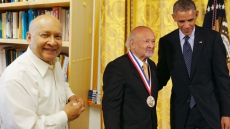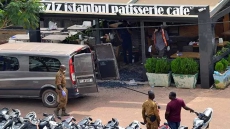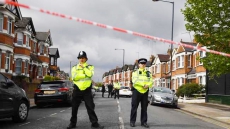WILLIAMS LAKE, B.C. — Restrictions on travel to British Columbia's backcountry and bans on campfires were lifted in some parts of the province on Wednesday as improved conditions lowered the wildfire risk.
Campfires were once again allowed in most areas of the Prince George and northwest fire centres while officials from the BC Wildfire Service say a ban prohibiting access to the backcountry in the Cariboo region was also scheduled to be rescinded by the end of the day.
Kevin Skrepnek of the wildfire service said although calm weather conditions are expected to change in the coming days, forecasted storms shouldn't be severe and will bring more rain.
The restrictions were extreme and reflected the severity of a historic wildfire season that has seen more than 10,000 square kilometres of land scorched, Skrepnek said.
Campfire bans in the northern parts of the province are rare, Skrepnek said, as was a ban on access to Crown land, such as lakes, forest service roads and recreational sites, in the Cariboo district, which has been hard hit by wildfires.
"Putting the backcountry closure in place was a pretty extraordinary move and we were doing that to basically use every tool we had at our disposal to prevent human-caused fires," Skrepnek said, adding the last similar ban was in 2003.
"We believe that the threat has lessened to an extent where we're happy to rein back in something that unusual, that disruptive."

Gusty winds were expected to pick up with incoming thunderstorms Thursday that could aggravate existing fires in the region, Skrepnek said, which is why access to areas immediately around the 49 fires in the Cariboo remained restricted.
The province was expected to issue maps online highlighting the affected areas.
There were 138 fires burning across B.C. on Wednesday and people were urged to check the provincial wildfire information website for the latest information about bans on campfires and off-road vehicles.
Areas where campfire bans were lifted include the Prince George, Fort St. James, Mackenzie, Peace, Fort Nelson, Skeena Stikine and Coast Mountain forest districts.
Skrepnek said local municipalities may maintain their own restrictions on campfires and people should check with local fire officials to be certain of the rules.
The number of people effected by evacuation orders dropped to about 2,600 on Wednesday from 45,000 earlier this summer.
An area in the Central Kootenay district downgraded its evacuation order to an alert late Tuesday, allowing more people to return home.
"These downgrades are another sign of the situation moving in a positive direction but we stress that ... there is still a fair bit of risk," said Chris Duffy with Emergency Management BC.

Authorities asked people to be careful while conditions remain dry in much of the province and to report any wildfires immediately.
The wildfire service has spent an estimate $370.5 million on fighting fires since April 1.
The Insurance Corporation of B.C. said it has received 124 claims related to the wildfires, mostly for vehicles damaged by the extreme heat and smoke, costing a total of $500,000.
REOPENING OF SOME BACKCOUNTRY TRAILS IN B.C. MARKS PROGRESS IN WILDFIRE BATTLE
KAMLOOPS, B.C. — The Ministry of Forests says calmer weather and continuing progress battling British Columbia's many wildfires means hikers and campers can soon return to some parts of the backcountry in the central Interior.
Recreation Sites and Trails BC says select campsites and trails in the Cariboo fire centre will reopen at noon on Friday.
The sites were closed July 13, one week after a lightning storm tore across the central Interior, sparking dozens of separate wildfires that forced 45,000 people from their homes.
The number of evacuation orders has declined over the last two weeks and Emergency Management BC said Wednesday about 2,600 people remained out of their homes as 138 fires continued to burn.

Although some backcountry areas will reopen Friday, the ministry says other trails and recreation sites remain closed.
A campfire ban also remains in effect throughout the Cariboo fire centre, which covers most of central B.C. including Williams Lake and Quesnel, the closest commutes to a 4,600 square kilometre wildfire that is the biggest ever recorded in the province.




